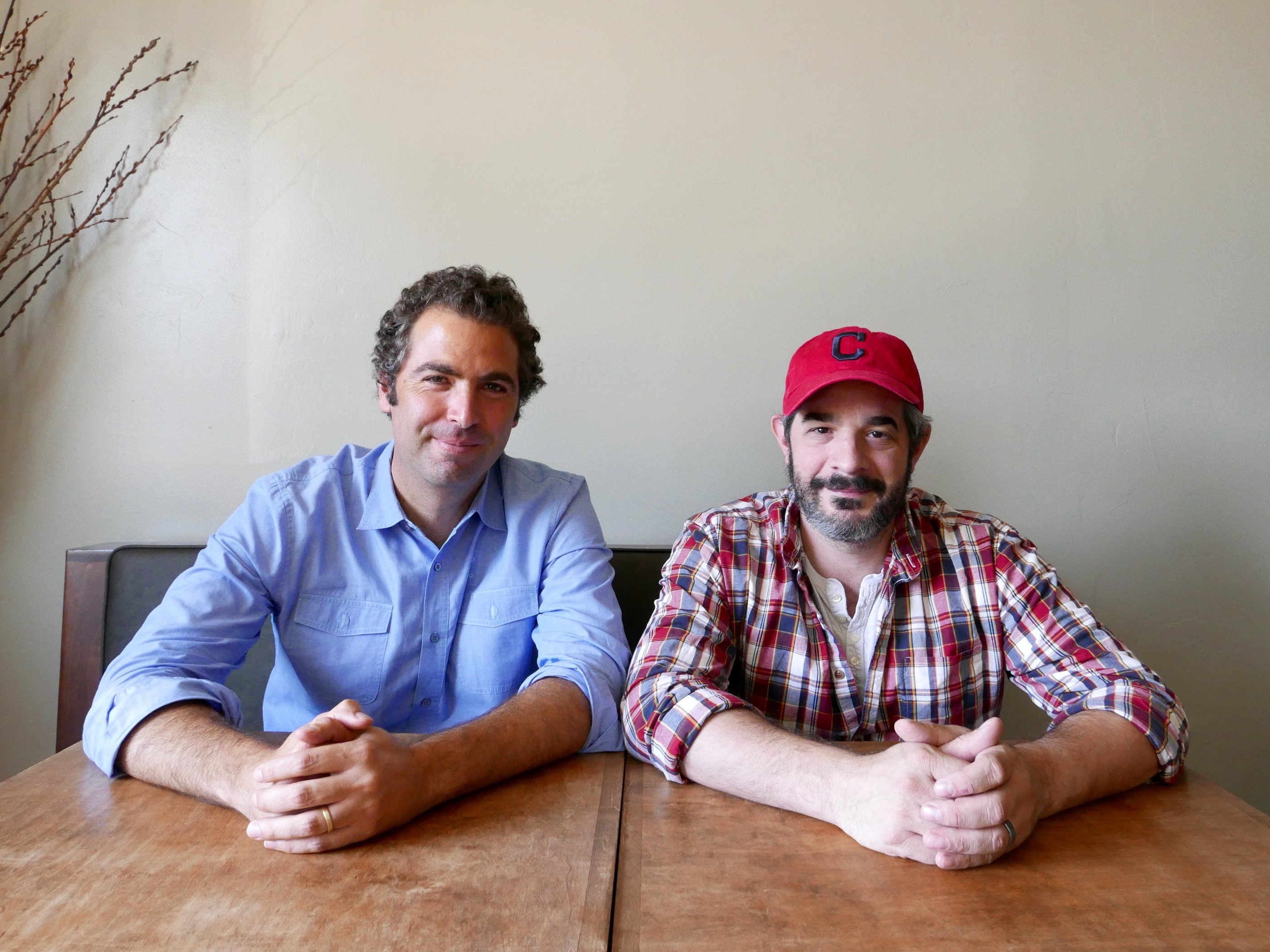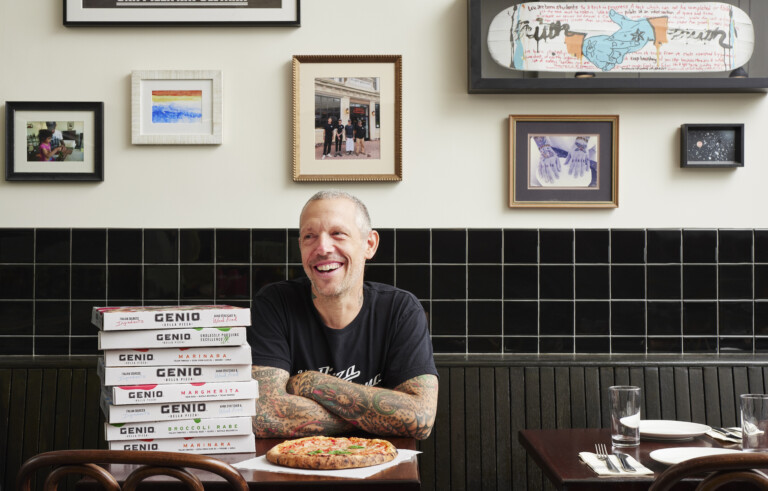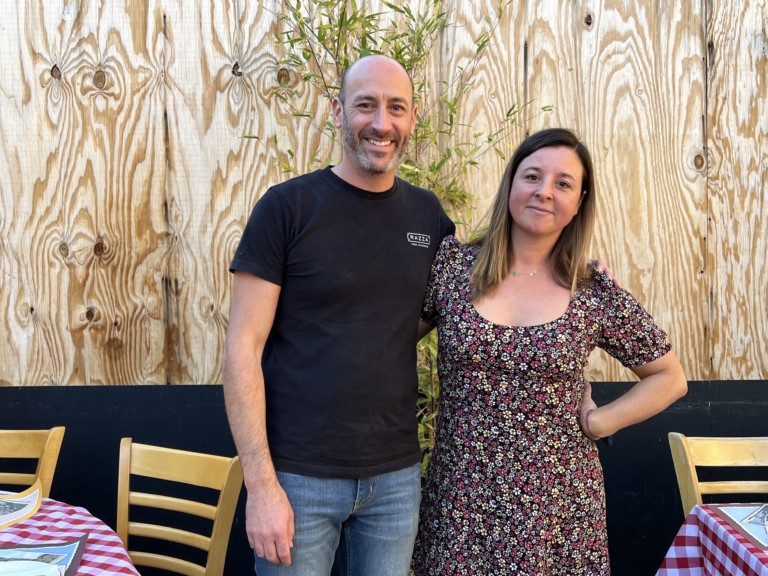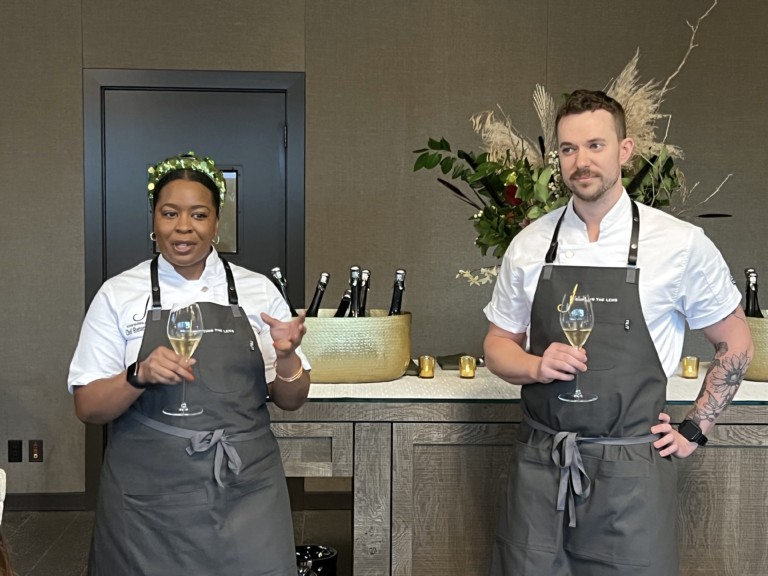INTERVIEW CONTINUED FROM PREVIOUS PAGE
JL: Who gets to work at Rustic Canyon, and what attributes do these people have to have? Has that changed in the last decade?
Loeb: Speaking for front of house, half the people who are here have been here since the first couple years, so we have a lot of longevity here. Just like the kitchen takes on a style – I always say in restaurants – you want to get to a point where everybody’s speaking that restaurant’s language. So it’s not like, “Hey, how would Josh like it? How would Jeremy like it? How would [chef de cuisine] Brittany [Cassidy] like it?” This is the Rustic way. Front of house is a certain style. It’s a very honest communicator, somebody who speaks not in clichés and sales pitches, but someone who truly loves the food, takes time to learn about the food, and the wines and the cocktails, and expresses that.
A lot of things come about organically. We got our full liquor license four and a half years ago. We wanted our cocktail program to be reflective of the markets and simple and not intimidating. We brought in a consultant at the time. He helped us, and he helped us learn a lot. One of our bartenders [Aaron Ranf] was like a sponge. He had never made cocktails before. He used to be on the bar serving beer and wine, but he was a sponge. He loved it. He would study up and doing it on his own time and he morphed into our bar director/mixologist. He creates all the cocktails. He’s super inspired and does a lot of techniques he learned from Jeremy. He goes into the kitchen and says, “I’m thinking about doing this. What about that? What if I juice this, or pickle this?”
A lot of it comes from people who truly care about food, who understand our style of hospitality, which is warmth and directness and honesty. That’s the person who works for Rustic now.
Fox: Above all, you just have to be nice. Out on the floor, in the kitchen, there’s no hazing. A lot of kitchens I came up in, there’s sabotage and just a lot of aggression. That doesn’t work here. I kind of made it a rule, when you come in, you have to say hello. Don’t just come in and go to your station or come out here and just start folding napkins. Everyone says hello to each other. That’s the kind of environment you want. We’re always striving to be better and a better restaurant. This is not just a place you go to work. This is a family. Whether I have to say, “We’re going to act like a family,” whatever it takes. Not, “We’re going to eat together and we’re going to enjoy it!”
Loeb: That’s a really good point. One of our internal mottos is, “What can we do to get better every day?” It’s a really important part. If a restaurant gets a good review or a good acknowledgment, my thing, and I’m pretty extreme about this, “Give everyone a quick pat on the back and forget about it.” You can just as easily get an awful review. None of that matters. What matters, “Are you getting better every day?” That’s what you can control. Are you learning more about the food? Are you learning more about the wines? Are you thinking of ways to provide better service to customers?
Is the kitchen evolving? When we took the burger off a few years ago, it was a scary moment. We were known for this burger, but that’s all we were known for, for like four years. It sucked because we were doing so much more. Can we get better? Can we get better taking away things and not be attached to these things that we think define us? That’s when a restaurant gets stale. Rustic Canyon is by far the best it’s ever been. It’s not even close. You ask anyone who’s worked here, you ask our customers, it is the best it’s ever been. It’s because we’ve been committed to that. Forget about it. Forget about what people love. If you’re not inspired by it, stop making it.
JL: Are there any dishes that have protected status, that you would never take off the menu?
Fox: Yeah. When I was younger, I didn’t want any signature dishes. If anything got too popular, it went away and never came back again. We have the posole, which is always on the menu. We’ve really gone to great lengths to standardize and make it like our Big Mac. Every one tastes the same, and we have to roll with it. Sometimes the jalapenos are hotter than others. Sometimes the cilantro’s a little stronger than others. We have to roll with that and adjust. Everyone gets to taste it before it goes out, and if it’s not right, it gets thrown out and made again. The beets and berries is one dish that stays on. We were gapping on avocados for about a month last year, so we had to take it off, and the world didn’t end. Things continued. Other than that, everything is pretty much fair game. We’re always thinking, “Could we tweak out the posole? Is it where we want it?” If we don’t come up with a better way, then it stays where it is.
JL: What makes them signature dishes? Is it sales figures, or just the way you feel about the dishes?
Fox: It’s probably a combination of those things. Obviously we have to think we’re executing at a high level. If we’re doing something that represents the restaurant and fits, and posole definitely did that. I’ve moved away from conceptual dishes like that, but at the time, that’s what I thought the new Rustic Canyon was about. I still think it fits here.
Loeb: If you ever got sick of it, you’d just take it off. There’s no written contract that posole has to stay on the menu, or beets and berries, or any of those things. It’s about what feels right to you.
Fox: Yeah, and we’ve already taken something very popular off the menu. If we’re able to move on from the burger, I think we can move on from the posole.
JL: Josh, you’ve had restaurants now for 10 years. When did you know that you’d be a lifer in the restaurant world?
Loeb: I don’t know if I am a lifer, to be completely honest. I felt very, very passionately about wanting to do a certain thing, which is open a certain style of restaurant, and open a few of them, that all complement each other. Santa Monica’s my home. It’s where I was born and raised. It was incredibly devoid of quality casual restaurants. There were a couple good high-end restaurants. There were a lot of casual places not sourcing from the markets and not making things by hand. There was essentially a huge opportunity, and being somebody that likes my world kind of small, I wanted to do a bunch of things that complemented each other. Every place we’ve opened has come from, “I wish we had this,” or, “This is a great opportunity for somebody in our group to do something special.” I will probably do one or two other projects, and both will be with Jeremy. I think we’ve found a real union. Then I just really want to let the restaurants continue to grow and support each other. Otherwise, it’s just going to be too big and we won’t be able to maintain the hands on quality that I really like and appreciate. I’ve just been trying to follow my gut. I went and opened a restaurant with no restaurant experience. I got whatever experience I felt I needed, but it was really about this idea and this burning desire to do this thing. I trust in that. I know what’s next and also when enough is enough.
JL: Tell me a bit of what you have in mind for your next projects together. It doesn’t have to be address or timeline or anything. What have you been aching to do that you’re not able to accomplish at Rustic Canyon?
Fox: I don’t know that it’s about what I can’t accomplish at Rustic Canyon. It’s maybe other styles that I’d like to explore. It’s also kind of recognition of the amazing staff that I have, that I want to have other projects for them. At some point, my sous chefs here can outgrow this and they’re ready to expand their horizons and do their own thing, and I would love to be the one that can give them that outlet. That’s a big driving force.
Loeb: And just to do something from the beginning. Jeremy’s taken over this kitchen and the restaurant as a whole and really put his stamp on it and made it his own. But he wasn’t here the first six years, and a lot gets formulated in those first few years. Just for the experience of starting from scratch and designing your own kitchen.
Fox: Sure. That’s the oven I want. And I want this here, and this here. To be able to design that from the beginning and create whatever restaurant culture I want for that building, that’s definitely attractive for me.
JL: Will these be casual places or higher end?
Fox: Casual.
JL: Who else continues to inspire you in the restaurant world? Do you look to outside inspiration at this point?
Loeb: I get inspired a lot by the people I work with. Zoe and I make it out a couple nights a week without the kids, now that Felix is one, and we generally end up in our own restaurants. One, because there’s a familiarity and comfort and from a work standard, it’s good to be able to go in and check, and I get a really good discount. Honestly, I think that I work with the best chefs in the city, and there are a lot of chefs I really love in this city. I truly believe that Jeremy is one of the most talented people, and not just chefs, but artists, in the world who I’ve ever met. I don’t just say that because he’s sitting right here. Bryant [Ng] is unbelievable. He opened this incredibly large restaurant with this huge menu and it was just near flawless from day one. Erin [Eastland] really doesn’t get much press attention, probably by choice – she doesn’t like being in the spotlight – but she’s running two incredibly high-volume kitchens. The food at Milo & Olive is so good and so simple and so beautiful, from brown butter gnocchi to their specials. She took over Huckleberry last year and she’s done amazing things there. She’s revamped the whole menu. Shiho [Yoshikawa] and her ice cream. I think of Kathryn [Weil Coker] as a chef too. The way that she’s put together her wine program, there’s a reason she’s the one partner that’s not a chef. The essence and spirit of that place is the wine program, and she treats it that way. There are other chefs, I enjoy eating their food, but I don’t spend a whole lot of time out and about.
Zoe and I spent six weeks in Portland this summer, and I found that very inspiring, just the simplicity of the dining scene there, the fact that there were so many places doing one thing or two things really well. Part of that’s the economics. It’s cheaper. You can afford a space and just do one thing, because you don’t have to make several thousand dollars a day to get by. Travel definitely inspires me and gives me a real focus. I always feel like I come back from trips with ideas and inspiration for our restaurants.
JL: What about you, Jeremy?
Fox: I have to say the same thing. I’m inspired by who I’m surrounded by every day. I don’t get out a whole lot. I don’t really read about food a whole lot. I’m kind of out of the loop on much of the restaurant business. I’m in a little bubble here. I love that part of it. I’m inspired by Josh, and learned a ton from him, and not just in terms of running a business, but how to work with people, how to treat people. I’m definitely inspired by people who have multiple restaurants like Josef Centeno. How they maintain quality even on higher volume.









Blog Comments
Free Food in Glendale, Cheap Lobster in the Valley, and Ramen in Indio | Yummy Everyday
October 14, 2016 at 9:11 AM
[…] Rustic Canyon, the seminal Santa Monica restaurant that Fox has helmed for a few years now. It’s interesting to hear the pair chat about what the place has become, about Fox’s enduring vision for what he’s trying […]